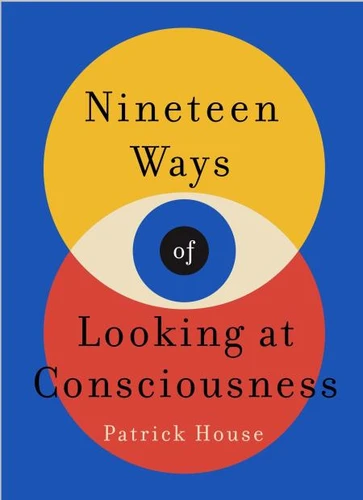Nineteen Ways of Looking at Consciousness. Our leading theories of how your brain really works
Par :Formats :
Disponible dans votre compte client Decitre ou Furet du Nord dès validation de votre commande. Le format ePub protégé est :
- Compatible avec une lecture sur My Vivlio (smartphone, tablette, ordinateur)
- Compatible avec une lecture sur liseuses Vivlio
- Pour les liseuses autres que Vivlio, vous devez utiliser le logiciel Adobe Digital Edition. Non compatible avec la lecture sur les liseuses Kindle, Remarkable et Sony
- Non compatible avec un achat hors France métropolitaine
 , qui est-ce ?
, qui est-ce ?Notre partenaire de plateforme de lecture numérique où vous retrouverez l'ensemble de vos ebooks gratuitement
Pour en savoir plus sur nos ebooks, consultez notre aide en ligne ici
- Nombre de pages272
- FormatePub
- ISBN978-1-0354-0005-8
- EAN9781035400058
- Date de parution10/10/2022
- Protection num.Adobe DRM
- Infos supplémentairesepub
- ÉditeurWildfire
Résumé
"Stylish, witty and insightful" -The Wall Street Journal"Makes us look at ourselves and the human mind in a series of fascinating ways" - New Scientist"House is a pleasure to read. Like Oliver Sacks ..." - Los Angeles Review of BooksA concise, elegant, and thought-provoking exploration of the mystery of consciousness and the functioning of the brain. Despite decades of research, remarkable imagery, and insights from a range of scientific and medical disciplines, the human brain remains largely unexplored.
Consciousness has eluded explanation. Nineteen Ways of Looking at Consciousness offers a brilliant overview of the state of modern consciousness research in twenty brief, revealing chapters. Neuroscientist and author Patrick House describes complex concepts in accessible terms, weaving brain science, technology, gaming, analogy, and philosophy into a tapestry that illuminates how the brain works and what enables consciousness.
This remarkable book fosters a sense of mystery and wonder about the strangeness of the relationship between our inner selves and our environment."In addition to being an intellectual pleasure, this is an aesthetic one as well - House writes like a dream, with great drollness and elegance of phrase. This book is a gem." - Robert Sapolsky, MacArthur Fellowship winner and author of Behave"A highly unusual but brilliant book ...
with a distinct voice that is fiercely unique." - Christof Koch, president and chief scientist, Allen Institute for Brain Science
Consciousness has eluded explanation. Nineteen Ways of Looking at Consciousness offers a brilliant overview of the state of modern consciousness research in twenty brief, revealing chapters. Neuroscientist and author Patrick House describes complex concepts in accessible terms, weaving brain science, technology, gaming, analogy, and philosophy into a tapestry that illuminates how the brain works and what enables consciousness.
This remarkable book fosters a sense of mystery and wonder about the strangeness of the relationship between our inner selves and our environment."In addition to being an intellectual pleasure, this is an aesthetic one as well - House writes like a dream, with great drollness and elegance of phrase. This book is a gem." - Robert Sapolsky, MacArthur Fellowship winner and author of Behave"A highly unusual but brilliant book ...
with a distinct voice that is fiercely unique." - Christof Koch, president and chief scientist, Allen Institute for Brain Science
"Stylish, witty and insightful" -The Wall Street Journal"Makes us look at ourselves and the human mind in a series of fascinating ways" - New Scientist"House is a pleasure to read. Like Oliver Sacks ..." - Los Angeles Review of BooksA concise, elegant, and thought-provoking exploration of the mystery of consciousness and the functioning of the brain. Despite decades of research, remarkable imagery, and insights from a range of scientific and medical disciplines, the human brain remains largely unexplored.
Consciousness has eluded explanation. Nineteen Ways of Looking at Consciousness offers a brilliant overview of the state of modern consciousness research in twenty brief, revealing chapters. Neuroscientist and author Patrick House describes complex concepts in accessible terms, weaving brain science, technology, gaming, analogy, and philosophy into a tapestry that illuminates how the brain works and what enables consciousness.
This remarkable book fosters a sense of mystery and wonder about the strangeness of the relationship between our inner selves and our environment."In addition to being an intellectual pleasure, this is an aesthetic one as well - House writes like a dream, with great drollness and elegance of phrase. This book is a gem." - Robert Sapolsky, MacArthur Fellowship winner and author of Behave"A highly unusual but brilliant book ...
with a distinct voice that is fiercely unique." - Christof Koch, president and chief scientist, Allen Institute for Brain Science
Consciousness has eluded explanation. Nineteen Ways of Looking at Consciousness offers a brilliant overview of the state of modern consciousness research in twenty brief, revealing chapters. Neuroscientist and author Patrick House describes complex concepts in accessible terms, weaving brain science, technology, gaming, analogy, and philosophy into a tapestry that illuminates how the brain works and what enables consciousness.
This remarkable book fosters a sense of mystery and wonder about the strangeness of the relationship between our inner selves and our environment."In addition to being an intellectual pleasure, this is an aesthetic one as well - House writes like a dream, with great drollness and elegance of phrase. This book is a gem." - Robert Sapolsky, MacArthur Fellowship winner and author of Behave"A highly unusual but brilliant book ...
with a distinct voice that is fiercely unique." - Christof Koch, president and chief scientist, Allen Institute for Brain Science



